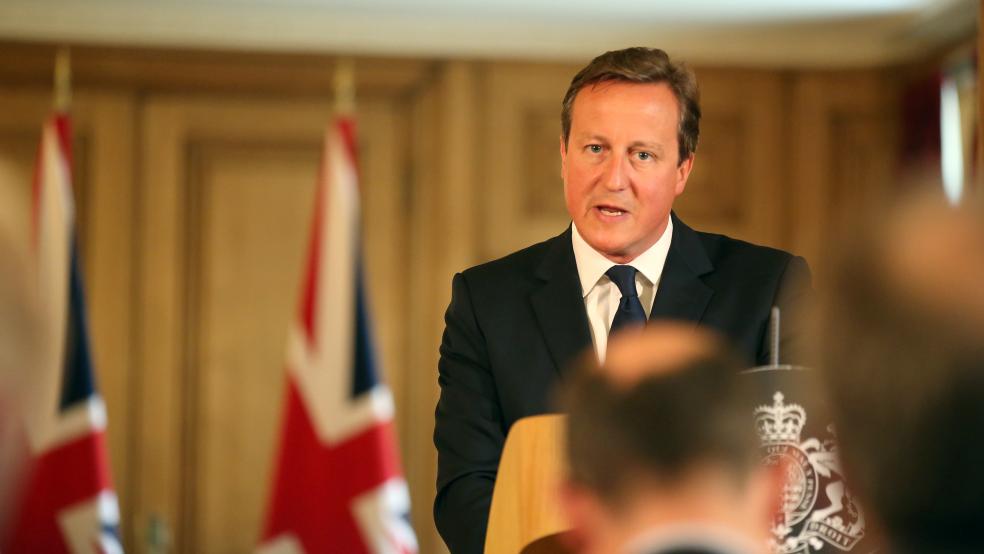The contrast between U.K. Prime Minister David Cameron’s speech Friday morning about the threat posed by the terror group ISIS and remarks delivered just one day earlier by President Obama was stark.
Cameron was more forceful and sounded more decisive. He denounced the “poisonous ideology” of the Islamist extremist group currently occupying parts of Syria and Iraq and said ISIS must not be allowed to expand its reach lest the world face “a terrorist state on the shores of the Mediterranean.”
Related: Obama Plays the Long Game with ISIS and Ukraine
Cameron even wore a better suit.
What the two leaders had in common, however, was the lack of an articulated plan for dealing with ISIS. Obama’s problem was that he came right out and said it.
“We don’t have a strategy yet,” said Obama, adding that he wanted to lower expectations of any immediate military response to ISIS. “I think what I’ve seen in some of the news reports suggests that folks are getting a little further ahead of where we’re at than we currently are.”
The result was sarcastic headlines across the country Friday morning. Cameron, by contrast, went heavy on the opprobrium, obscuring the fact that he also made no mention of concrete actions – apart from things that are already being done – that he thinks the U.K. and its allies ought to take.
Related: ISIS Invades Social Media…and Gets Turned Back
Cameron’s remarks came in the context of the British government moving its terrorist threat level to “severe,” meaning an attack is highly likely, and he took the opportunity to pin the threat squarely on the Islamist extremists.
“This threat cannot be solved simply by dealing with the perceived grievances over Western foreign policy,” he said. “Nor can it be dealt with by addressing poverty, dictatorship or instability in the region, as important as these things are. The root cause of this threat to our security is quite clear. It is a poisonous ideology of Islamist extremism that is condemned by all faiths and by all faith leaders. It believes in using the most brutal forms of terrorism to force people to accept a warped worldview and to live in an almost medieval state.”
Cameron went on at length about the failings of the ISIS ideology. But when it came to specifics about what to do about the jihadist terror group, he spoke in generalities.
“We need a tough, intelligent, patient and comprehensive approach to defeat the terrorist threat at its source,” he said. “Tough in that we need a firm security response, whether that is action to go after the terrorist international cooperation on intelligence, on counter-terrorism or uncompromising measures against terrorists here at home. But it also must be an intelligent political response. We must use all resources we have at our disposal: aid, diplomacy, political influence and our military.”
Related: The U.S. Military Campaign Against ISIS May Cost $15B a Year
Social media nonetheless exploded with comparisons between the prime minister’s response to ISIS and the president’s. It was the second time in a week that Cameron overshadowed Obama in his perceived forthrightness as a chief executive and sense of urgency about responding to the growing ISIS menace.
Last Wednesday, Cameron canceled his summer vacation and returned to London to convene emergency meetings with his advisers about ISIS. This was just after the terror group released a video showing the brutal beheading of American journalist James Foley. The hooded executioner who spoke in the video had an accent that clearly indicated he came from Britain.
Obama, by contrast, departed for his favorite golf course on Martha’s Vineyard after making a condolence call to Foley’s parents and delivering a stern statement to the press vowing to eradicate “the cancer” of ISIS from the Middle East.
Americans may be growing impatient with Obama’s cautious, temperate approach to the growing crisis and signaling they “want a larger U.S. role in trying to solve problems around the world,” according to a new USA TODAY/Pew Research Center Poll published today.
Fifty-four percent of those interviewed said the president is “not tough enough” in pursuing foreign policy and national security, according to the survey. The nationwide poll of 1,501 adults showed broad dissatisfaction with Obama's handling of crises in the Middle East, Iraq and Russia. The survey was conducted Aug. 20-24, and coincided with the news of Foley’s execution.
According to the USA Today analysis, Americans “increasingly are open to a larger U.S. role” overseas after “years of retrenchment” in the wake of two costly wars in Iraq and Afghanistan. Still, just like members of Congress, the public remains at odds over how far to go in responding to overseas crises. According to the survey, 39 percent say the U.S. already does too much to try to solve world problems, while 31 percent say the U.S. does too little.
“That reflects a significant change from less than a year ago, when in a previous Pew Research Center poll Americans by an overwhelming 51 percent-17 percent said the U.S. did too much,” according to the USA Today analysis.
Top Reads from The Fiscal Times:






